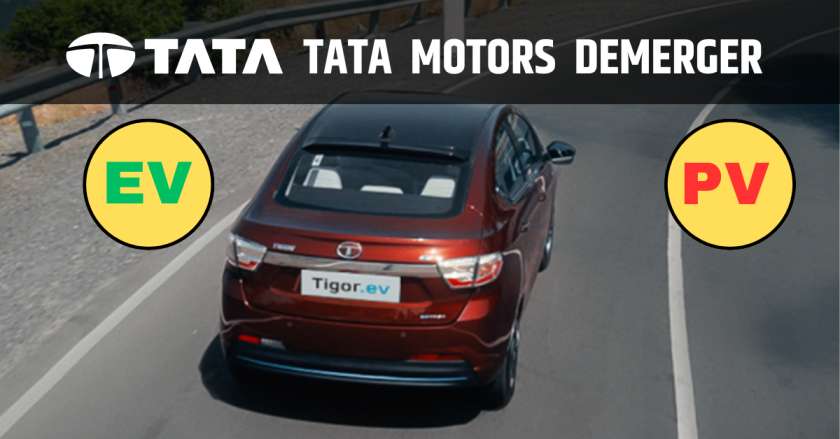Tata Motors Demerger: Tata Motors, a flagship company of the Tata Group, has been a prominent player in the global automotive industry for decades. Known for its innovative approach and commitment to excellence, Tata Motors has continually evolved to meet the changing demands of the market. Recently, the company has made headlines with its strategic decision to demerge its passenger vehicle (PV) and electric vehicle (EV) businesses. This move aims to enhance operational efficiency, attract focused investments, and unlock significant value for shareholders. Let’s delve into the details of this significant development and its potential impact on the company and the industry.
Tata Motors Demerger: Rationale Behind the Demerger
The decision to demerge Tata Motors’ PV and EV businesses stems from the need to create distinct and focused entities that can operate independently and efficiently. The PV segment, which includes cars and utility vehicles, has been a cornerstone of Tata Motors’ business. However, the rapidly growing EV market presents unique challenges and opportunities that require dedicated attention and resources. By separating these two segments, Tata Motors aims to:
- Enhance Focus: The demerger allows each business to concentrate on its core competencies, market dynamics, and growth strategies. The PV business can focus on improving its market share, product portfolio, and customer experience, while the EV business can prioritize innovation, technology, and sustainability.
- Attract Investments: The automotive industry is undergoing a significant transformation with the rise of electric mobility. By creating a separate EV entity, Tata Motors can attract specialized investments and strategic partnerships, enabling it to accelerate the development and deployment of electric vehicles.
- Operational Efficiency: Independent entities can streamline their operations, reduce complexities, and improve decision-making processes. This can lead to faster execution of strategies, cost optimization, and enhanced agility in responding to market changes.
- Unlock Shareholder Value: The demerger is expected to unlock value for shareholders by providing greater transparency and clarity in the performance of each business. Investors can better assess the potential and risks associated with the PV and EV segments, leading to improved valuation and market perception.
Tata Motors Demerger: Implementation and Structure
The demerger process involves creating a new subsidiary that will house the EV business. Tata Motors will retain a significant stake in this subsidiary, ensuring continued support and alignment with the parent company’s vision. The PV business will remain under Tata Motors, continuing to leverage its strong brand and market presence.
The implementation of the demerger is expected to be carried out in a phased manner, ensuring minimal disruption to ongoing operations. The company has emphasized its commitment to maintaining a seamless customer experience and delivering on its existing product commitments during this transition period.
Tata Motors Demerger: Impact on Tata Motors
The demerger is poised to have several positive impacts on Tata Motors:
- Accelerated Growth in EV Segment: The creation of a dedicated EV entity will enable Tata Motors to capitalize on the growing demand for electric vehicles. With increased focus and resources, the company can expedite the development of new EV models, expand its charging infrastructure, and enhance its technological capabilities.
- Enhanced Market Position: Tata Motors’ PV business can sharpen its competitive edge by concentrating on customer preferences, product innovation, and operational excellence. This renewed focus is expected to result in improved market share and profitability.
- Financial Flexibility: The demerger will provide Tata Motors with greater financial flexibility to allocate resources and investments strategically. This can lead to optimized capital allocation, reduced debt levels, and improved financial health.
- Sustainability Leadership: Tata Motors has been a pioneer in promoting sustainable mobility solutions. The demerger reinforces its commitment to environmental sustainability by creating a separate entity dedicated to electric mobility, aligning with global trends towards cleaner and greener transportation.
Tata Motors Demerger: Industry Implications
Tata Motors’ decision to demerge its PV and EV businesses reflects broader industry trends and dynamics:
- Electric Mobility Surge: The global automotive industry is witnessing a paradigm shift towards electric vehicles. Automakers are increasingly focusing on EVs to meet stringent emission regulations, address climate change concerns, and cater to changing consumer preferences.
- Strategic Realignments: Several automakers are exploring similar strategic realignments to navigate the evolving landscape. The demerger trend is gaining traction as companies recognize the need to create agile and specialized entities to thrive in the new era of mobility.
- Investment Opportunities: The demerger opens up new investment opportunities for stakeholders interested in the EV sector. Specialized EV entities are likely to attract venture capital, private equity, and strategic partnerships, fostering innovation and growth.
Conclusion
The demerger of Tata Motors’ PV and EV businesses marks a pivotal moment in the company’s journey towards future-ready mobility solutions. By creating focused entities, Tata Motors aims to drive growth, operational efficiency, and shareholder value. As the automotive industry continues to evolve, this strategic move positions Tata Motors as a proactive and adaptive player, ready to lead the charge towards a sustainable and electrified future.
